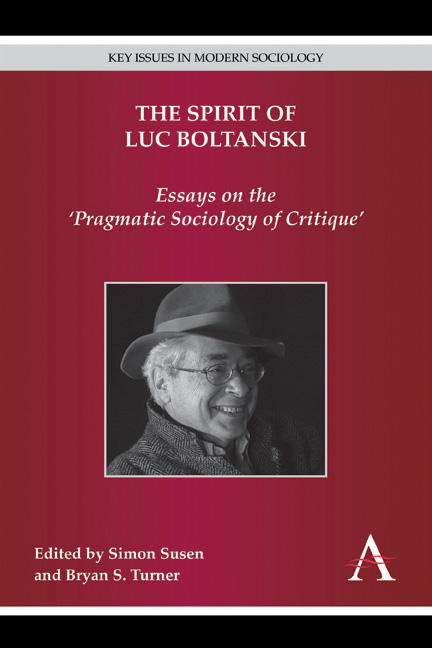Book contents
- Frontmatter
- CONTENTS
- List of Contributors
- Preface
- Part I Introductory Remarks
- Part II Luc Boltanski and (Post-) Classical Sociology
- Part III Luc Boltanski and Pragmatism
- Part IV Luc Boltanski and Critique
- Part V Luc Boltanski and Critical Sociology
- Part VI Luc Boltanski and Political Sociology
- 12 The Promise of Pragmatic Sociology, Human Rights, and the State
- 13 ‘The Political’ in the ‘Pragmatic Sociology of Critique’: Reading Boltanski with Lefort and Castoriadis
- 14 Axel Honneth and Luc Boltanski at the Epicentre of Politics
- 15 The Civil Sphere and On Justification: Two Models of Public Culture
- 16 Luc Boltanski in Euroland
- 17 Reflections on the Indignation of the Disprivileged and the Underprivileged
- Part VII Luc Boltanski and Contemporary Issues
- Part VIII Luc Boltanski in Conversation
- Part IX Luc Boltanski and His Critics
- Index of Names
- Index of Subjects
14 - Axel Honneth and Luc Boltanski at the Epicentre of Politics
from Part VI - Luc Boltanski and Political Sociology
Published online by Cambridge University Press: 05 December 2014
- Frontmatter
- CONTENTS
- List of Contributors
- Preface
- Part I Introductory Remarks
- Part II Luc Boltanski and (Post-) Classical Sociology
- Part III Luc Boltanski and Pragmatism
- Part IV Luc Boltanski and Critique
- Part V Luc Boltanski and Critical Sociology
- Part VI Luc Boltanski and Political Sociology
- 12 The Promise of Pragmatic Sociology, Human Rights, and the State
- 13 ‘The Political’ in the ‘Pragmatic Sociology of Critique’: Reading Boltanski with Lefort and Castoriadis
- 14 Axel Honneth and Luc Boltanski at the Epicentre of Politics
- 15 The Civil Sphere and On Justification: Two Models of Public Culture
- 16 Luc Boltanski in Euroland
- 17 Reflections on the Indignation of the Disprivileged and the Underprivileged
- Part VII Luc Boltanski and Contemporary Issues
- Part VIII Luc Boltanski in Conversation
- Part IX Luc Boltanski and His Critics
- Index of Names
- Index of Subjects
Summary
A systematic reconstruction of the theory of the struggle for recognition developed by Axel Honneth (1995b [1992]) allows for the identification of two central and intimately related analytical axes: the moral-sociological-explicative axis and the historic-philosophical-reconstructive axis (Basaure, 2007 and 2011b).
The moral-sociological-explicative axis represents the conceptual effort to provide an explanation for the moral motives of subjective actions at the root of social struggles. In this theory, Honneth begins from a re-reading of Hegel and Mead and focuses on a non-utilitarian moral-sociological explanation of social conflicts, according to which the motivations for initiating, or committing to, social struggles can be traced back to experiences in which one was not recognized as having generated negative moral feelings. The objective and cognitive nature of those feelings resides in the fact that they express the breakdown of the system of reciprocal expectations of behaviour at the subjective level. That system is in turn based on values anchored in the intersubjective structures of mutual recognition, upon which the formation and development of personal identity are based. Honneth's ‘theory of recognition’ describes the intersubjective, historical-moral construction of a subjectivity that can be sensitive to forms of moral damage and can react to that damage with negative moral feelings. These feelings can form the motivational basis for social struggles. This moral-sociological perspective, which is based on the link between conflict and normativity, is captured in the subtitle of Honneth's renowned book The Struggle for Recognition: The Moral Grammar of Social Conflicts (Honneth, 1995b [1992]; cf. Basaure et al., 2009).
The historic-philosophical-reconstructive axis, on the other hand, is geared towards proposing a framework of historical interpretation of processes of moral construction within which specific and concrete struggles can be inscribed as moments in larger processes of moral development and learning. In this way, such struggles lose their merely contingent constitution, ceasing to represent separate episodes, and are understood in the context of a deployment and historic broadening of the moral structures of reciprocal recognition – that is, of processes oriented towards moral learning (Honneth, 1995b [1992]; Basaure et al., 2009).
- Type
- Chapter
- Information
- The Spirit of Luc BoltanskiEssays on the 'Pragmatic Sociology of Critique', pp. 391 - 412Publisher: Anthem PressPrint publication year: 2014

